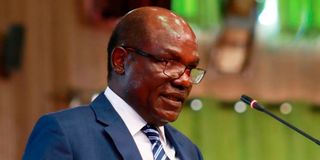Citizens, not democracy, to blame for bad leaders

IEBC Chairman Wafula Chebukati
Kenyans are ever complaining about poor leadership and lacklustre performance by elected officials, occasioned by evidence of vices like economic mishandling, poor infrastructure, disorganised healthcare system and corruption.
This country’s democracy has many faults, chief among them that only a third of the population get heard. The minority who have a say have little time for the essence of democracy, the right of everyone to an equal share in all decisions that affect them.
Despite the blemishes, however, our democracy is fairly healthy. People in power here are not trying to prevent anyone from voting—as those in the US or Britain are. Unlike Brazil or the Philippines, this government is not run by admirers of military dictatorship. The government is not trying to deprive minorities of their citizenship rights—as India’s is.
There is no danger of the coups that have installed undemocratic regimes in Mali, Sudan and Tunisia. Neighbours envy our environment of free speech, expanded civic space, judicial independence and, more importantly, periodical peaceful transitions.
Democracy
Plato opined that democracy is a terrible system, a prelude to tyranny, giving power to selfish and dangerous demagogues. Watching democracies around the world, it’s hard to disagree with the Athenian philosopher. Democracy appears to produce an abundance of incompetent and dishonest political leaders who exploit people’s credulity and prejudices and thrive on emotion-driven discourse and fake news. But is it the problem or the people who put leaders into office through a democratic election?
After the elections, we begin the next election cycle by disparaging the leaders who, a few months earlier, were our darling. The passion exhibited by most people about their preferred candidates during campaigns is often too high on emotion that it leads to deadly political violence. Sadly, we quickly retreat to our daily struggles with a lot of bitterness, having traded our birthright for a piece of candy.
Towards the campaign homestretch, politicians employ every trick in the book to win an election—including outright deception, propaganda, fake news and voter buying. From the standpoint of ordinary people, this is when equality and justice are temporarily achieved, as politicians fulfill their financial obligation to support them in times of need.
Democracy provides an environment in which the citizens are presented with a pool of options. In a free and fair election, they have a voice and the tools to choose leaders of integrity and shun the contemptuous. Naturally, one would expect that a candidate with criminal allegations hanging over them will repel voters. But in Kenya, the reverse is true.
Interior Cabinet Secretary Fred Matiang’i warned stakeholders in the criminal justice system that criminals may buy their way into elective office, resulting in 40 per cent of officials being fraudsters and money launderers. Failure of IEBC and the courts to stop people with integrity issues from running leaves Kenyans to make the ultimate decision: Reject them at the ballot. Let the people decide.
Mr Mbiti, an advocate of the High Court of Kenya, is an anti-corruption expert. [email protected]. @MwongelaMbiti





